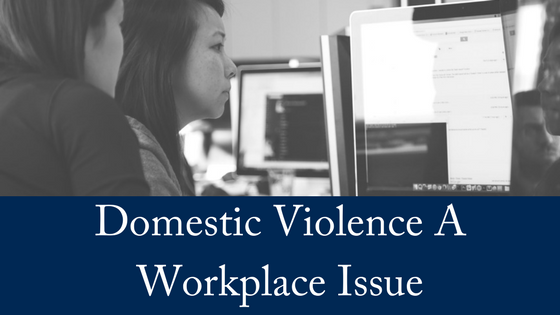Is domestic violence a workplace issue, or is it just a social issue that has no bearing on the workplace?
The Australian Human Rights Commission says that domestic and family violence is a workplace issue. Having domestic violence as a new protected attribute in anti-discrimination legislation can provide another avenue of protection for victims and survivors who experience discrimination, as well as lead to improved measures for addressing domestic/family violence.
In Australia, approximately one woman is killed by her current or former partner every week, often after a history of domestic and family violence.
- 34% of women have experienced physical violence since the age of 15.
- 17% of women have experienced violence from a current or former partner since the age of 15 (compared to 5.3% of men).
- 30% of respondents to a 2011 survey on domestic and family violence and the workplace reported they had experienced violence, and 5% of those respondents had experienced violence in the last 12 months.
Why is domestic and family violence a workplace issue?
 The Australian Human Rights Commission goes on to say that domestic and family violence is not just a private or personal issue. When an employee is living with domestic and family violence, there are often very real costs and negative impacts that flow to the workplace.
The Australian Human Rights Commission goes on to say that domestic and family violence is not just a private or personal issue. When an employee is living with domestic and family violence, there are often very real costs and negative impacts that flow to the workplace.
Here’s why:
Health costs: In Australia, intimate partner violence is the leading contributor to death, disability and illness in women aged 15 to 44 years. It is responsible for more of the disease burden in women than many other well-known risk factors, such as smoking and obesity.
Economic costs: In 2002/03 the cost of intimate partner violence to the Australian economy was estimated at $8.1 billion. If no preventative action is taken, this cost is projected to rise to $9.9 billion annually by 2021/22. $235 million of this $9.9 billion will be borne by employers and $609 million will be borne in production-related losses.
Workplace costs: Within the population of women who have experienced violence, or are currently experiencing violence, the Australian Bureau of Statistics estimates that between 55% and 70% are currently in the workforce – that is, approximately 800,000 women, or around one in six female workers. This means that a significant number of Australian workplaces will be impacted by women’s experiences of domestic and family violence.
Some common costs and impacts include:
- Decreased staff performance and productivity
- Increased staff turnover and absenteeism
- Negative impact on the organisation’s reputation and image.
Impacts on employees: Research into the workplace implications of domestic and family violence has demonstrated how such violence can undermine the working lives of both victims and survivors.
The 2011 National Domestic Violence and the Workplace Survey found that nearly half (48%) of respondents who reported experiencing domestic and family violence said the violence had affected their ability to get to work. The main impact of violence was on work performance – 16% of victims and survivors reported being distracted, tired or unwell and 10% needed to take time off work. Further, women who experience domestic and family violence are also more likely to have lower personal incomes, a disrupted work history, often have to change jobs at short notice and are very often employed in casual or part time work.
Victims and survivors of domestic and family violence can face a number of challenges in the workplace. There is a growing body of evidence which shows that victims and survivors of domestic and family violence often experience discrimination related to their experience of domestic and family violence, particularly in the workplace.These women may be discriminated against, for example, as a result of taking time out of work (sick leave or carers leave) or because they temporarily have lower levels of productivity due to the violence that they are experiencing at home.
Discrimination related to the experience of domestic and family violence can take the form of:
- being denied leave or flexible work arrangements that would assist victims and survivors to attend to violence-related matters, such as attending court or moving into a shelter
- having employment terminated for reasons relating to the violence they are experiencing, including a drop in performance or attendance caused by the domestic and family violence, or
- being transferred or demoted for reasons related to the violence.
How Your Workplace Can Support Victims of Domestic Violence
There are a range of actions a workplace can take to ensure that they are providing adequate support for victims and survivors of domestic or family viole nce.
nce.
The role of leaders
An important first step is for workplaces to begin a conversation about domestic and family violence – one where employers send a clear message to their employees that:
- domestic and family violence is an issue that affects the workplace
- those experiencing it are not alone
- they should feel confident that disclosing a violent situation will not result in adverse consequences for them or their employment, and that
- bystanders should stand up against violence in the workplace.
Establish clear policies and procedures
- Develop a policy about supporting women who are victims and survivors of domestic and family violence.
- Develop policies for safe work places, free from harassment and bullying, which also deal with employees who perpetrate violence in the workplace.
- Ensure these policies and procedures are clearly articulated to staff and that employees are encouraged to make use of them.
Make provision for leave or flexible work arrangements
- In their enterprise agreements or awards, workplaces can provide dedicated paid leave for women experiencing domestic and family violence. As of 2013, over one million Australian workers are able to avail themselves of leave and other protections made available through domestic and family violence clauses in their agreement or award conditions.
- Offer flexible work arrangements, as provided for under the Fair Work Act.
For compassionate care with any issue with domestic violence, please contact us today. We offer a FREE, 10-minute phone consultation.

